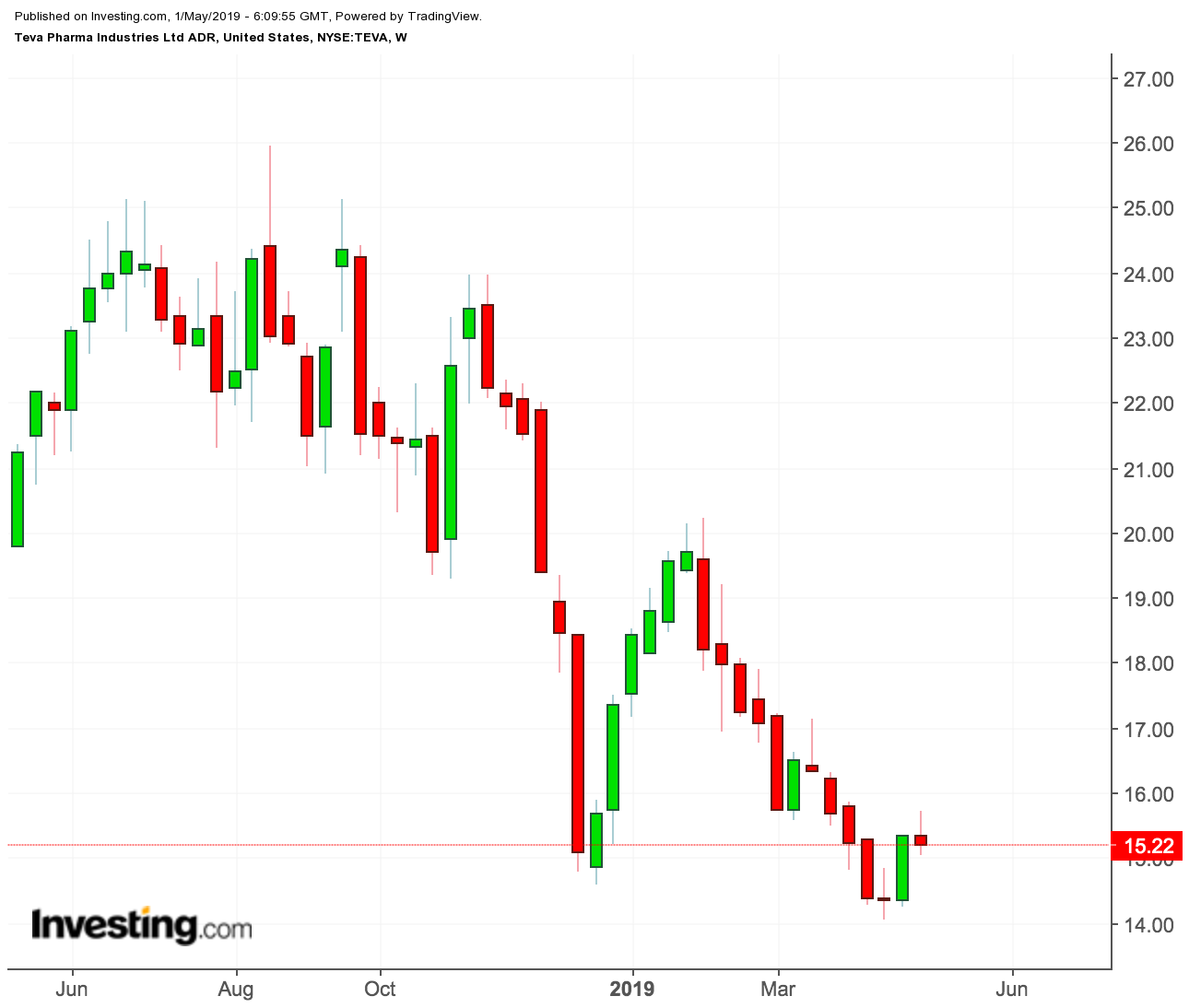* Reports Q1 2019 results on Thursday, May 2, before the market open
* Revenue Expectation: $4.38 billion
* EPS Expectation: $0.58
Teva Pharmaceuticals' (NYSE:TEVA) turnaround has been a tough sell for its Chief Executive Officer, Kare Schultz, at least in 2019.
The share price of the world’s largest manufacturer of generic drugs has tumbled more than 40% from the 52-week high reached in August, amid concerns that the worst for the company’s growth isn’t over yet. Its stock was trading at $15.22 a share at yesterday's close, after sinking 2.5% through the session.

Analysts’ consensus forecast for profit and sales for the first-quarter suggests the investment community still remains doubtful about the company’s transition to stability. During tomorrow's release, Israel-based Teva is likely to report its profit fell to $0.58 a share from $0.94 a share from the year ago period, while sales to shrank 13.5% to $4.38 billion, according to analysts’ average estimate.
Teva is trying to recover from a slump, started in the summer of 2015, that sent its shares tumbling as the company invested heavily to grow its copycat medicines business. That happened at a time when margins began to shrink in the U.S. amid fierce competition from other pharma producers. The biggest setback came when Teva lost its monopoly on Copaxone, a blockbuster multiple sclerosis injection that at one point generated half of Teva’s profits.
That bearish outlook, however, will change quickly if Schultz can show that his cost-cutting efforts are working and the company has been able to control the decline in sales. We feel that outcome is unlikely this year, given the company’s earlier warnings that growth will not return until next year and that 2019 will continue to be a “tough” year.
Teva Is a Compelling Value Play
But Teva, in our view, offers a compelling value opportunity if your investing horizon is long-term and you’re comfortable staying invested for the next few years. One big reason making us bullish on this beaten-down stock is the CEO’s measurable success in trimming Teva’s costs and its huge pile of debt.
Against a very tough operating environment, Schultz managed to cut spending by $2.2 billion last year and will close or sell another 11 manufacturing plants in 2019, which would bring the total figure to about 60 sites.
Teva is also on track to meet its overall target of $3 billion in savings by the end of 2019, and may close more plants afterward, Schultz said in February. As a result of these measures, the company’s debt has fallen to $29 billion from its 2016 peak of $36 billion.
Teva’s robust pipeline of new drugs is another bright spot in the company’s turnaround plan. The recent approval of its next-generation migraine medication Ajovy has so far not created much excitement, but this drug has a great future and could bring in a significant new revenue stream in the next two to three years.
More than 36 million people suffer from these debilitating episodes and the medicine could generate around $500 million in sales by 2022, according to analysts’ estimates. Teva's Huntington's disease medicine Austedo could also prove another big revenue generator, which would help the drugmaker arrest the slide in its sales. Austedo's peak sales are forecast to reach as high as $1.3 billion within the next three years.
Bottom Line
Despite the 2019 setback, we continue to see improvement in Teva’s financials and investor perception going forward as the company successfully implements its three-year turnaround plan and the U.S. generic drug market shows signs of stability. Schultz’s belt-tightening, an impressive pipeline of new drugs, and the backing of large investors, including Warren Buffett’s Berkshire Hathaway Inc. (NYSE:BRKa) and Capital Group Companies, make Teva a good turnaround stock for long-term investors.
